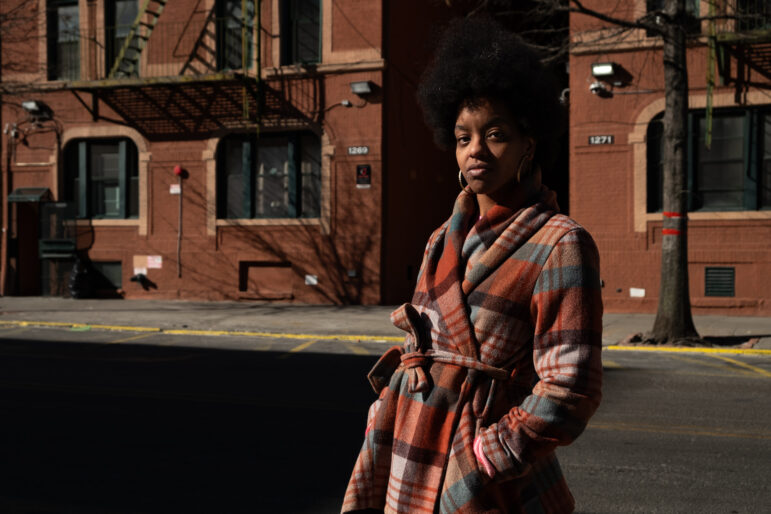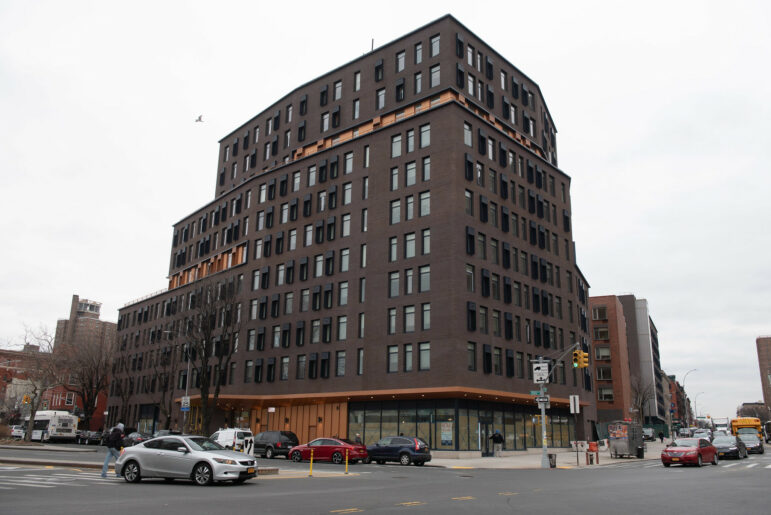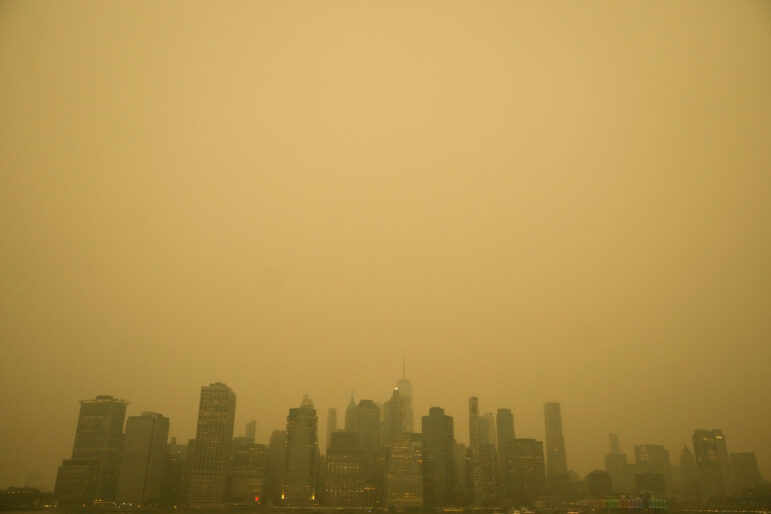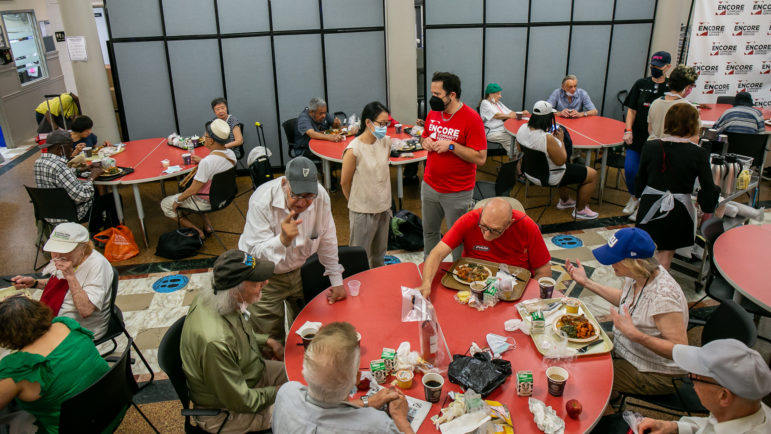Although some are still only high school or college age, Generation Z—generally about 25 and younger—has established itself as the most engaged generation in climate action.
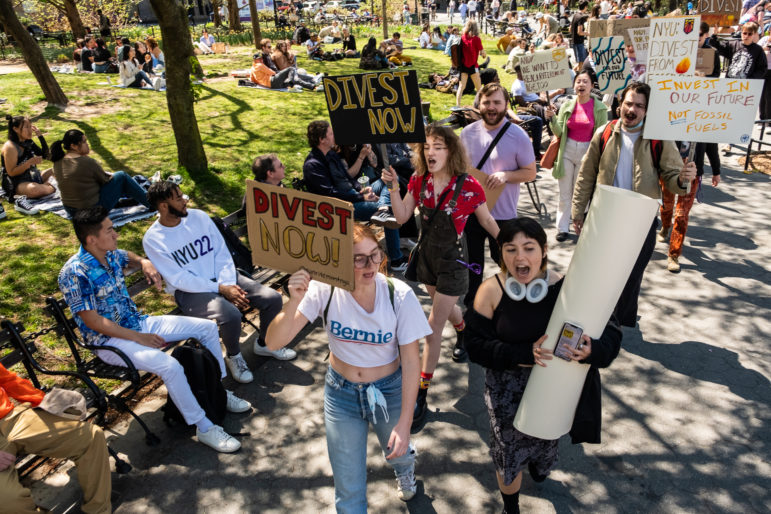
Adi Talwar
New York University students rallied on Earth Day demanding NYU’s endowment divest from fossil fuel companies.On her first day at the prestigious Beacon High School in Manhattan, Daphne Frias took a walk during lunch and became overwhelmed by the colors surrounding her.
She walked past rows of vibrant produce stacked up in midtown markets and fridges of bright pink meat and realized how starkly different the food options looked than in the West Harlem neighborhood where she grew up.
“It looked like a coloring book,” she said. “Like if someone chose the brightest markers in the pack and used those to color in all the fruits and vegetables.”
The realization—and the anger that followed—was a turning point for the now 24-year-old medical student and climate activist. “It was the first time that I was very clearly exposed to how your social economic status dictates the quality of your life,” she said.
While a sophomore in high school, Frias studied the correlation of asthma rates and auto pollution in Washington Heights through the Lang Youth Medical Program, a high school collaboration with Columbia Presbyterian Hospital. Suddenly, it clicked—public health and climate were inextricable, and understanding the connection would be something that she still carries with her now, a decade later, as she works toward a career as a neurologist.
Frias also has a personal reason for wanting to improve public health policy: At 3 years old, she was diagnosed with cerebral palsy. Although there’s been a lot of progress in pediatric care for the condition, adults get little medical guidance in how to manage it later in life. She wants to change that—without losing sight of how climate and the environment affect overall health.
“You have to be pushing as the fiercest advocate for your patients and you have to understand how their environment and their lived experiences impact their health,” she said. “Fighting the climate crisis, which is going to be—if it’s not already—one of the greatest risks for our patient population, that makes me a better doctor.”
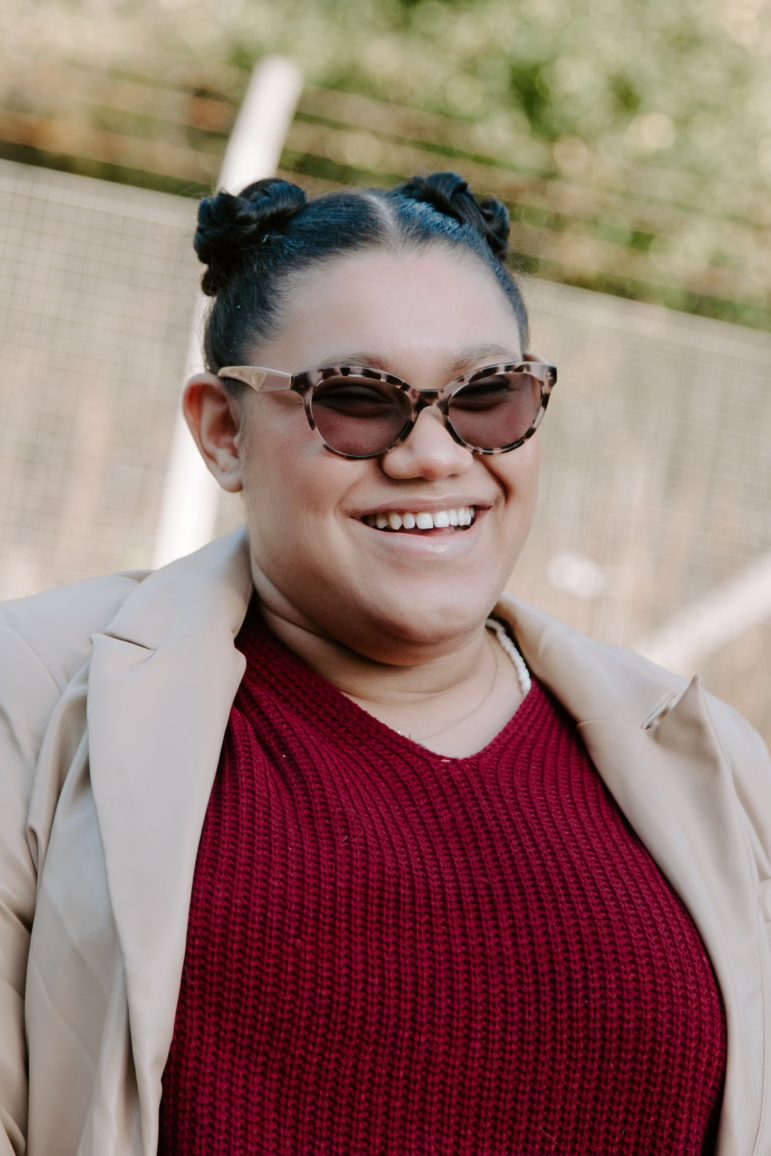
Courtesy Daphne Frias
“Fighting the climate crisis, which is going to be—if it’s not already—one of the greatest risks for our patient population, that makes me a better doctor,” activists and medical student Daphne Frias says.Frias would go on to travel the globe, meeting with world leaders to spread the word about the urgency to act on climate change alongside Greta Thunberg and other youth activists. And although a leader in the movement, she is not an outlier among young people who are demanding elected officials and leaders take a strong stance on climate change and environmental racism.
Although some are still only high school or college age, Generation Z—generally about 25 and younger—has established itself as the most engaged generation in climate action.
READ MORE: ‘What Keeps Me Motivated Is Taking Action’—Panel Explores Pressures and Expectations Placed on Youth Climate Activists
In an April Pew Research study of individuals 18 and older, more than one-third of Gen Z respondents said that climate change was their top personal concern, and 67 percent reported that they had talked about the need for climate action at least once or twice recently at the time of the survey—topping Millennials, Generation X and Baby Boomers for both questions.
The urgency is even more pronounced among Gen Z teens. In a national survey of 1,500 13- to 19-year-olds by 4-H, three-fourths reported that teens feel “responsible to protect the future of our planet.” More than 8 out of 10 said they expect to make future decisions based on climate change and believe that if change doesn’t begin now, it may be too late for future generations.
This focus on the environment also crosses party lines. Nearly half of Gen Z and Millennial respondents to the Pew survey who identify as Republican say that climate change should be a priority, compared with only 1 in 4 Baby Boomers and older Republicans.
Young voters, however, are notorious for low voter turnout, and such is the challenge for Saad Amer, 27, the cofounder of Plus1Vote. He confirms it can be difficult mobilizing to the polls a population eager for change but disillusioned by the country’s political system—where politicians use climate as a platform but then take little action to push progressive policies.
“There have been many young people and young climate activists who have aged into that voting demographic who are very excited to get out and vote and who are also very disillusioned by a system that casts them aside,” said Amer, who also works as a consultant for the United Nations and was an expert reviewer of the Sixth Assessment Report of the Intergovernmental Panel on Climate Change.
“Our current context makes the voting a lot more difficult for young people and particularly, people of color across the country,” Amer added. With that in mind, Amer brings a three-prong approach to action: not only voting, but also divesting from fossil fuel companies and demonstrating.
Data shows that some younger activists may be more focused on these political strategies. A third of Gen Z survey takers reported that they had recently taken alternative approaches to direct action—donating, calling elected officials or rallying—to address the climate crisis.
Tens of thousands of young people have taken part in climate marches in New York City in recent years: One such rally in Manhattan in 2019 drew an estimated 60,000 attendees, according to reports. A similar event downtown last fall saw more than 2,000 marchers, according to a Columbia University flash-survey of participants, which found that more than half of those participants—whose average age was 16—said it was not their first climate protest.

At Schwartz Plaza, Brianna Bellamy addressing the attendees of an Earth Day Rally organized by New York University students. 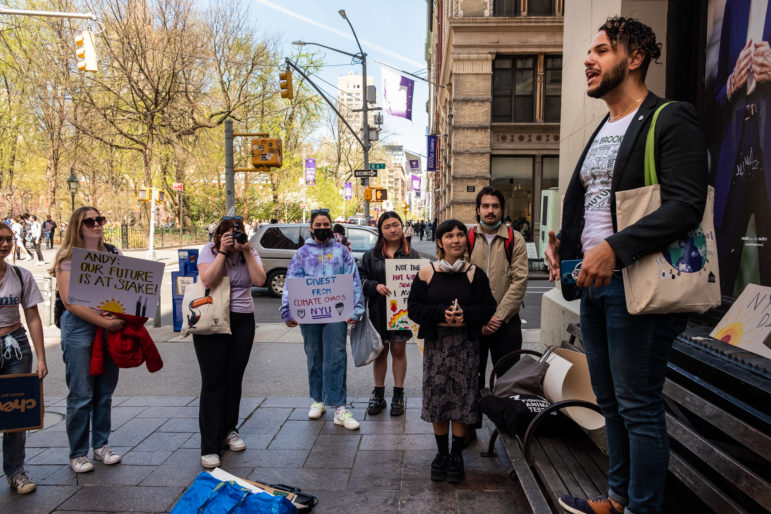
New York Assembly candidate Samuel Nemir Olivares addressing the attendees. 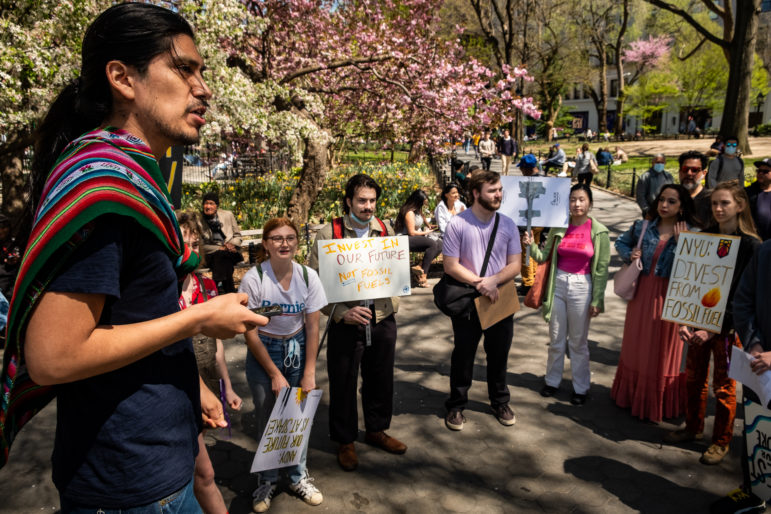
The rally was a part of an ongoing campaign demanding NYU’s endowment divest investments in fossil fuel companies.
Alicia Colomer, a 20-year-old student at New York University, has pressured her university to divest its endowment from the fossil fuel industry. In October 2020, she started an NYU sector of the Sunrise Movement, a national youth climate movement, and has since gotten more than 1,500 NYU community members to sign a petition demanding divestments.
Campus climate movements are spreading through other universities across the city. At The New School, Marikit Mayeno, 22, runs an undergraduate climate club that focuses on using artistic expression to engage students in conversations surrounding the climate crisis.
In one recent campaign, she encouraged students to write notes of appreciation about the earth and read them over Instagram, an effort that allowed her to engage with over 100 students about sustainability in that week alone. She’s also been able to connect with students at affiliated programs in Paris and bring the conversation to an international context.
“Something that just gives me an incredible amount of hope is collaborating with people that have completely different focuses and fields and to come together with one common goal and one common passion,” she said.
Thoughts of the future can also bring feelings of uncertainty and anxiety for the younger generation, who in the last year alone experienced wildfires, multiple record-breaking heat waves and flash flooding that killed more than a dozen people. Dire reports from the Intergovernmental Panel on Climate Change suggest that these events will only become more frequent and more severe unless immediate action is taken.
For many activists, slow-moving action from Congress and local leaders does not match the urgency of the moment.
Colomer and her friends talk about not wanting to have children and feeling uncertain about the world she’ll live in. “It’s really hard for us to plan for our future or have long-term goals because there’s this big uncertainty, and then added to that is a feeling that no one is listening to us, or no one cares,” she said.
Amer admits that it’s difficult to avoid feelings of pessimism but that he vacillates between that and feeling driven to push harder for action.
“Frustration can do two things: It can paralyze you into inaction and throw you into apathy or it can motivate you into organizing, into redesigning our system to be something that actually works for us and reflects who we are.”
For Daphne Frias, who is now in medical school and recently returned from two weeks advocating for climate action in Europe, the future remains bright for her and her peers.
She said she wants to be a “human microphone” for people in the community in which she grew up, advocating for using hyperlocal solutions to global problems.
“[We] see ourselves as a generation defined by the very similar and often sad hardships that we’ve all come to face,” said Frias. “But at the same time, we are the fountains of hope.”
This article was edited to correct the age of Alicia Colomer, who was 20 at the date of publication.



